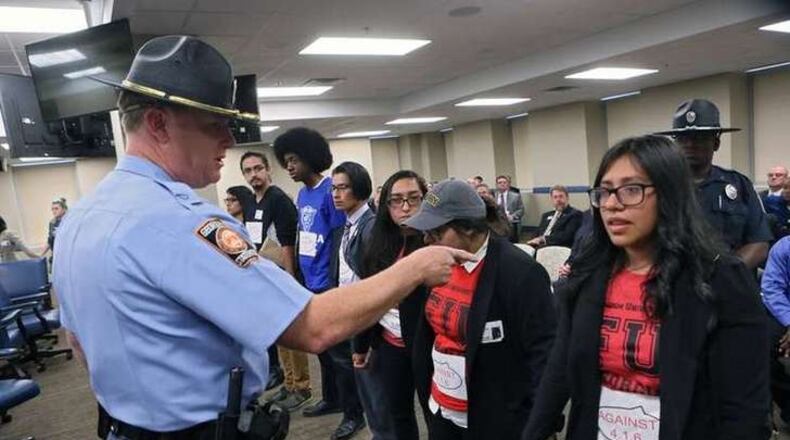Elizabeth Kiss is president of Agnes Scott College in Decatur. A few days ago, she announced her campus would maintain its support of undocumented students. In a column today, she explains why.
First, some background on what is turning into a volatile issue in Georgia: Many children of illegal immigrants are now attending college under the 4-year-old Deferred Action for Childhood Arrivals program. The federal program applies to young immigrants illegally brought to the U.S. as children, who attend school here and have no felony convictions. Those accepted into the program are granted temporary reprieves from deportation and permits to work legally in the U.S.
More 740,000 immigrants, including 23,000 Georgians, have benefited from DACA. Many now fear President-Elect Donald Trump will act on his promise to crack down on illegal immigrants and undo DACA.
Emory University and Agnes Scott have both taken stands, prompting a rebuke from a Georgia House leader. As the AJC reported:
Emory President Claire Sterk said last week that the school would follow state and federal laws but also continue to support its "Dreamers." She also said administrators were reviewing whether to declare Emory a "sanctuary campus and ways to protect all members of the Emory community." Following Trump's election, students and faculty from more than 100 universities have called on their administrators to declare themselves sanctuaries or otherwise protect students who are illegally in the U.S.
Today, the University System of Georgia released a statement warning that Georgia's public colleges must follow the law and cannot become sanctuary campuses, the term being used for those schools vowing to protect students who are illegal immigrants.
In its statement to The Atlanta Journal-Constitution, the university system said while they respect the rights of students, faculty and staff to express their views, “calls for institutions to implement policies and procedures that may violate state and federal laws are unacceptable. The University System of Georgia and its institutions have always abided by the law and will continue to do so. We expect our institutions to follow the law and cooperate with all federal and state agencies. As public employees we have a duty to uphold the law.”
With that background, here is a column from Dr. Kiss on the issue. By the way, her last name is pronounced “quiche." A 1983 graduate of Davidson College, Dr. Kiss received a B.Phil. and D.Phil. in philosophy from Oxford University in England. A Rhodes Scholar, she has held fellowships at the Harvard Program in Ethics and the Professions, the National Humanities Center and Melbourne University’s Centre on Applied Philosophy and Public Ethics. She specializes in moral and political philosophy and has published on moral judgment and education, human rights, ethnic conflict and nationalism, feminist debates about rights and justice and justice in the aftermath of human rights violations.
By Elizabeth Kiss
One teaches in an Atlanta-area public school with Teach for America and is an award-winning artist. Another is studying public health, focusing on strategies to help people prevent and manage chronic diseases like diabetes. A third is a math whiz who wants to pursue a Ph.D. in mathematics. And a fourth has interned with the energy company Exelon and is exploring a career in organizational management.
Who are they? These Agnes Scott students and alums were brought to this country as children. They were undocumented. But at the very first opportunity provided to them, they registered with the federal government through the DACA (Deferred Action for Childhood Arrivals) program. They are bright, hard-working young women who have played by the rules, graduated from high school, and passed a criminal background check. They want to become U.S. citizens and pursue the American Dream.
Agnes Scott’s DACA students do not receive a penny of state or federal aid – no HOPE scholarships, TEG grants, Pell grants, or federal student loans. They are not taking places away from American-born students on our campus. They are able to go to college because they receive private scholarship support which we raise from donors and foundations, and scrape together the rest of their college costs through the hard work of their families in housekeeping, construction, agriculture, hospitality, manufacturing and the U.S. military.
Credit: Maureen Downey
Credit: Maureen Downey
Why does Agnes Scott support DACA students? Because as a private, church-related institution, we believe children should not be punished for actions by adults over whom they had no control. We believe it is our right as well as our sacred obligation to invest in young people who have the skills and drive to make a difference in the world. And we are committed, in the words of our mission statement, to educating students to “think deeply, live honorably, and engage the intellectual and social challenges of their times.”
Today, the DACA program is at risk of being terminated, putting those with DACA status at risk of deportation. This would be a tragic loss to the America my parents taught me to love.
My father was a political prisoner in Hungary under both the Nazis and the Communists. He and my mother, along with my two sisters, came to America 60 years ago as refugees. They fled an evil communist regime in which the secret police arrested those who criticized the government and punished and targeted their wives, mothers and children.
My parents loved and celebrated America for its commitment to freedom, democracy, and fairness. In America, you could speak up and disagree with the government. In America, you could freely practice your faith. In America, you could build a business to provide jobs and contribute to your community. You could be welcomed and given an opportunity to build a new life as an American.
I believe passionately in these great American values. And I believe we live up to these values when we give bright, hard-working young people who have done nothing wrong the opportunity to learn, earn, and give back to this country.
About the Author
Keep Reading
The Latest
Featured




